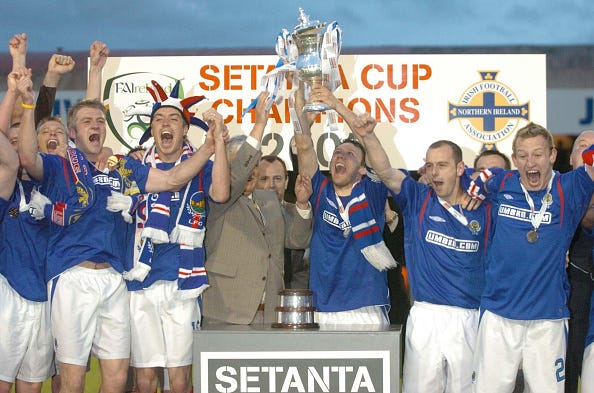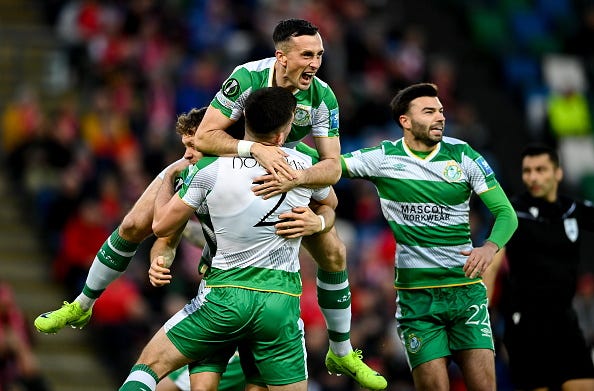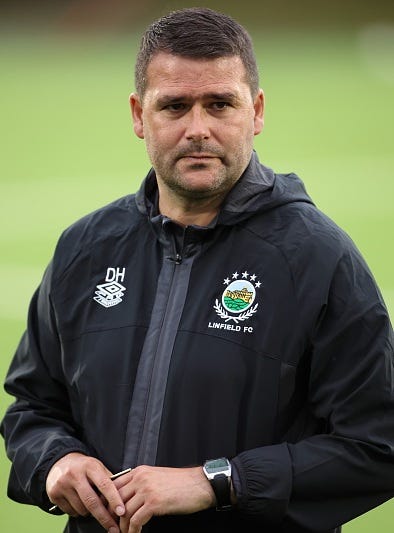No Duff fireworks but duel for north-south bragging rights still tantalising
Struggling Shelbourne face off against Healy’s well-prepared Linfield for Champions League progression
Damien Duff was spotted at his local gym in Bray a few short hours after it was announced that he had departed his post as Shelbourne manager last month. The 46-year-old had perpetually given off the vibe of someone with energy to burn during his near four-year spell in charge of the Dublin club, so it was hardly a surprise to see him busting a gut on an exercise bike on the day he gave up his job — but then doing the conventional has never really been part of Duff’s lexicon.
Perhaps it was a metaphor for the crossroads Duff found himself at — pounding the treadmill of daily life as a football manager. There is, it seems, increasingly a shelf-life in modern football management, certainly there is for the kind of clenched-fist, chest-beating variety that Duff specialises in. And, when keeping the pedal to the metal no longer seems to be getting a response — and six league defeats and nine draws seemed to suggest that might be the case — then maybe it is time to call it a day.
What’s clear is that in the final weeks of his time in charge at Shelbourne, he had become increasingly grouchy, even turning his ire on Stephen Bradley, the Shamrock Rovers manager, a friend who Duff himself admitted had encouraged him to take up coaching in 2015 — and who had also suggested he should throw his hat in the ring when a Celtic reserve team coaching position was going in 2019.
Despite the inconsistent nature of Shelbourne’s form this season, it nevertheless still came as a surprise to Irish football when it was announced that former Republic of Ireland winger Duff was stepping down. He has been box office in the League of Ireland ever since his appointment: winding up opposition fans, jousting with managers and presenting journalists with tap-ins for back page headlines. His absence leaves a gaping hole in the dugout at Tolka Park and in Irish football in general.
“I don’t think they’re going to fill it, it’s not like you can just get a like-for-like character in,” says Alan Cawley, a former Shelbourne player turned RTE football pundit.
“In 30 years as a fan, player and pundit I’ve never seen anyone have the impact he’s had: to take over in Division One, get promoted, and then go on and win the league like they did last year, it’s just been an incredible two or three years. It’s a massive, massive hole, not just for Shelbourne to fill, but also for the league.”
The Duff fallout has hung heavy over preparations for the forthcoming Champions League encounters with Linfield on July 9 and 16. Joey O’Brien, himself a former Republic of Ireland international, Premier League performer and Duff’s former assistant, has been given the unenviable task of taking over but Cawley thinks he might just be the right man for the job.
“Damien Duff has referenced that it wasn’t just him, it was Joey as well. If anyone has a chance of keeping them on the right road, I think it’s Joey, and we’ve already seen that in the last two games (draws against Waterford and Galway), because the performances have been quite good without getting the results.”
If O’Brien is walking into relative disarray ahead of the Linfield encounter his opposite number, David Healy, is a picture of calm.
The former Rangers striker — Northern Ireland’s all-time leading scorer — has just secured his sixth Northern Irish League title. Despite Linfield’s position as the pre-eminent club in the north this was a significant triumph because it ended Larne’s sequence of back-to-back titles and reasserted the Blues’ position — as winners of 56 leagues — at the top table. He might have lost his best player, Joel Cooper, to big-spending Coleraine this summer but Healy has no cause for alarm.
That’s because the Linfield board have been busy spending themselves. In January, they paid six figures for St Mirren striker Kieran Offord, then followed it up with a daring swoop for Falkirk’s Callumn Morrison, who scored 66 goals in 156 games during a five-year spell at the Bairns.
If Duff regularly swung for the bleachers, Healy plays with more of a straight bat but Chris Morgan, the former Linfield and Glentoran striker who also serves as a BBC Northern Ireland football analyst, is a fan.
“He’s won 13 trophies in 10 years as manager of Linfield and been manager of the year four times. He’s quite measured, you know. But he would also be very protective of Linfield’s reputation in terms of how they’re viewed at times. He’s not Damien Duff. Duff seemed to be somebody that would have called his players out a lot, but Healy doesn’t do that.”
Morgan was a regular participant in the qualifying rounds of European competition for the best part of a decade with Linfield, Glentoran and Crusaders, but he says the lustre of it was lost on him. Now, however, it is used as a carrot to dangle in front of prospective new signings.
“The lure of European football is something that seems to attract them. I played in Europe most years of my career and it didn’t really mean a lot, which is funny, I don’t really know why. It was like a nice bonus, but it wasn’t really viewed the way it is now. Maybe because we largely knew we weren’t going to qualify.”
One such occasion when he missed out on further progression in Europe came during a 4-1 Champions League humbling for a Glentoran side he was part of at the hands of Shelbourne in 2005.
“We had lost the first leg 2-1 at home and thought we had a chance going there but they were brilliant that night at Tolka Park,” he recalls of the first qualifying round, second leg.
“It’s probably the best Irish side I have ever seen. Wes Hoolahan was phenomenal. Jason Byrne played up front for them and he was a Republic of Ireland international. Eight or nine of their players made moves to England and Scotland shortly after that game, including Sean Dillon, who joined Dundee United.”
A few months earlier, Linfield and Shelbourne had met for the first and only time in the inaugural final of the now-defunct Setanta Cup. Cawley was on the bench for Shelbourne that night and recalls a terrific atmosphere with between 5,000 and 6,000 Linfield fans at Tolka Park. Linfield took the north-south bragging rights, winning that first final 2-0, but it was to be the only time a club from the north would lift the trophy.
“I suppose 20 years on, you kind of lose memories of some of the matches you may have played in, but that one sticks out because Linfield brought unbelievable support with them — they had more than Shelbourne. It was actually a great tournament and there was hope the Setanta Cup would kind of kick off into something big, and in the first couple of years it was huge. We used to take it very seriously, there used to be live coverage of every match on a Monday night and then it just kind of dwindled out.”

That tournament, with its huge sponsorship deal from the Irish broadcaster and prize money to the winners of €150,000, was seen as a pathway to untold riches, but it ceased to exist in 2014 due to the difficult nature of arranging fixtures which spanned two different playing seasons.
For clubs in the south, increased professionalism led to them moving clear of their northern counterparts. It left them well placed to capitalise when UEFA’s Champions Path opened up the potential for domestic league champions from lower-ranked associations such as the League of Ireland to progress deeper in Europe either via the Champions League or through easier access to the group stage of either the Europa or Conference Leagues. Last season, Shamrock Rovers did just that, only narrowly going out of the Conference knock-out playoffs to Norwegians Molde and pocketing around €7million from their sterling efforts.
Herein lie the atoms of a developing arms race in Irish football — across the island. In the north, Larne have spent millions backed by the financial heft of Kenny Bruce, who founded the Purple Bricks estate agency. Coleraine’s signing of Linfield’s Cooper — reportedly the highest-paid player in the history of the Irish League — has been bankrolled by 24-year-old multi-millionaire property developer Henry Ross while Glentoran owner Ali Pour recently revealed in a podcast that during the six years he has been involved with the Belfast club it has cost him between £600,000 and £1m per season. Linfield, meanwhile, posted a loss of £662,000 last year.
It is a similar story in the south. The Shelbourne chief executive Tomas Quinn said in May that his club was losing €1m a season. In total, nine clubs made losses totalling €7.6m. Measured against those numbers it makes securing progress in Europe a zero-sum game for both clubs. So much so that even qualifying can mean earning merely enough just to keep the lights on for the following season.
Morgan says: “Larne had to pay charter flights, there were other associated costs and they had to pay the ‘European tax’ when it came to making signings in terms of wages and transfer fees. They probably brought in as much as they paid out.”
Cawley says the advent of summer football — much debated as an option for the Scottish game — in 2003 was another factor that had a significant impact in establishing southern-Irish ascendency. For his part, Morgan says he would like the Irish League to follow suit on summer football.
“We should at least try it,” he says. “The worst that could happen is that it doesn’t work out and if that is the case we can always revert. The weather would be better, pitches would be better and you would hope the football would also be better.”
As such, Linfield will enter their latest head-to-head with Shelbourne at a slight disadvantage, even if their opponents have not been at their optimum level.
When Larne were humiliated by Shamrock Rovers in the sides’ Conference League match — staged at Linfield’s Windsor Park by virtue of UEFA regulations on ground capacities — it gave the naysayers in the south fuel for their belief that the League of Ireland was superior to the league in the north. But Morgan says there is little to read into that result.
“What people failed to take account of is that Larne play their games on astroturf. It was Larne playing at a neutral venue on a surface that arguably suited Shamrock Rovers better than it did Larne. Linfield will be a different proposition for Shelbourne. Larne struggled last season, just as Shelbourne haven’t been at their best this season and, of course, Duff has now gone.”

Cawley agrees.
“It’s a 50-50 tie. Linfield are obviously a brilliant club, huge history. Healy’s obviously a very good manager and they won the league last year. I would have fancied Shelbourne under Damien Duff but this season they’ve struggled. I suppose playing at home on each given night will probably be some sort of an advantage so I would probably just side with Shelbourne [in the first leg] but it’s really hard to call.”
On that note, Linfield won’t be taking thousands to Dublin this time around. They have had their allocation limited to 250 due to UEFA regulations and so the potential for the usual intense on-pitch heat that an All-Ireland clash might otherwise bring has been potentially doused.
And with Duff now gone there is unlikely to be many fireworks off the pitch either. Only in the minds of the money men will the mini-explosions be going off.





